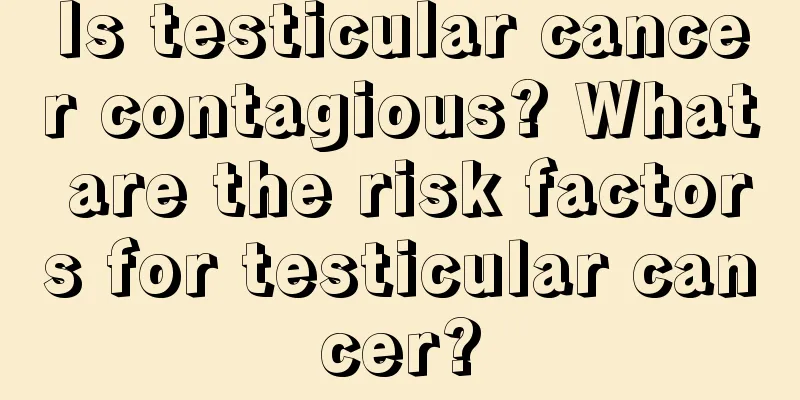Why does it hurt when I bite something hard?

|
The health of our teeth is very important to us. When our teeth are healthy, we feel happy every day and everything we eat tastes delicious. When there are problems with our teeth, it will directly affect our eating, which will in turn affect our mood. If you feel pain when biting down on something hard, you may be suffering from periodontitis. It is best to go to the dentist for a check-up. Why does it hurt when I bite something hard? This condition may be caused by periodontitis or pain caused by inflammation of the tooth root apex. In this case, it is best to go to the hospital for a thorough check-up. If it is caused by periodontitis, you can have your teeth cleaned, apply periodontal medication, and finally have loose teeth ligated and fixed. If it is caused by apical periodontitis, you can have root canal treatment and take oral anti-inflammatory drugs. Symptoms of periodontitis 1. Bleeding when brushing teeth Bleeding while brushing your teeth is the earliest and easiest symptom of gum inflammation. Regardless of whether the bleeding is intermittent or continuous, heavy or light, spontaneous or irritating from brushing or eating, it means that your gums are in very poor condition, or at least you have gingivitis. As for whether the bones have been affected, you need a professional examination by a periodontist for early treatment and control. Of course, some patients with periodontal disease do not bleed obviously when brushing their teeth. For example, long-term smokers have paler gums, a tougher texture, and less obvious bleeding tendency. There are also patients who do not brush their teeth seriously and only brush the teeth surface where they bite, which does not stimulate the gums at all. Long-term scientific research has shown that smoking is closely related to periodontitis and it promotes the development of inflammation, so regular periodontal examinations are the key to prevention and early treatment. 2. Swollen and painful gums In some places, acute inflammation of the gums may lead to abscesses, which may cause symptoms of swollen and painful gums. When the patient comes to see the doctor, he describes that there is a "big lump" on the gums, which may have just appeared or may be a recurring swelling. This is the "periodontal abscess" caused by periodontal inflammation, which often represents rapid and massive destruction of the local bone below, so it must be treated early. 3. Persistent bad breath Bad breath is a common oral disease. There are many reasons for bad breath, and periodontitis is an important one. Periodontitis can cause bleeding gums, tissue inflammation, and the metabolites produced by pathogenic bacteria can cause bad breath. 4. Swelling, itching or discomfort of gums Periodontal disease can cause swollen gums, and generally this swelling and damage is painless, so we call it the "silent killer." However, some patients may feel swelling, itching or discomfort in a certain part of the gums, and may even feel comfortable when touching them with a toothpick or fingers. This means you need professional periodontal examination and treatment. 5. Loose teeth or even falling off Loose teeth are a sign that inflammation has become severe to a certain extent. Some loose teeth can be relieved after treatment, while others may not be significantly effective. Such teeth will more or less affect your quality of life when chewing. If you find that some teeth have fallen out, you should come for a periodontal check-up immediately. The lifespan of other teeth in your mouth depends on your thoughts. 6. The gaps between teeth seem to be getting bigger Periodontal disease can cause the gums and underlying alveolar bone to recede, exposing the space between teeth that should be occupied by the gums and alveolar bone, making patients feel that the gaps between teeth are getting bigger. 7. Displacement of teeth, especially upper and lower front teeth Sometimes the loosening of teeth may not be very obvious, but many patients find that their upper or lower front teeth have gradually changed position over a period of time. For example, the middle gap between the front teeth becomes larger, one of the front teeth is twisted, the front teeth are sticking out, or there are scattered gaps between the lower front teeth. These are all symptoms of periodontitis. |
<<: Why does eating sweets cause toothache
>>: Successful experience in slimming down masseter muscle
Recommend
The benefits of drinking hemp seeds soaked in water
The effect of drinking hemp seeds soaked in water...
Symptoms of brain metastasis of small cell lung cancer? Six common symptoms
Lung cancer has a high possibility of metastasis....
Pancreatic cancer patients should be aware of their specific symptoms in a timely manner
Pancreatic cancer is a serious tumor disease that...
Will bone cancer be transmitted to my wife
Is bone cancer contagious? This is a question tha...
Can roses and wolfberries be soaked in water together?
I am a very particular person. The water I drink ...
What are the symptoms of lung cancer? Introduction to the basic symptoms of lung cancer
The first symptoms caused by the primary tumor ac...
How to prevent bile duct cancer scientifically
Many times, people are still afraid to see a doct...
How is liver cancer spread? Know the three ways liver cancer spreads early
For people who have liver cancer patients at home...
Can exercise improve skin?
Whitening and fitness are common topics for every...
What to do if your skin is dry and itchy in winter
The weather is cold in winter. Although we are wr...
What are the benefits of foot bath
There are many benefits of foot bath, such as pro...
What should I eat after colon cancer surgery
What should you eat after surgery for colorectal ...
How to effectively care for patients after pituitary tumor surgery
Postoperative care for pituitary tumors is also s...
Can throat cancer be cured by taking Chinese medicine?
Can throat cancer be cured by taking Chinese medi...
How to reduce the incidence of prostate cancer in men
How to reduce the incidence of prostate cancer in...









